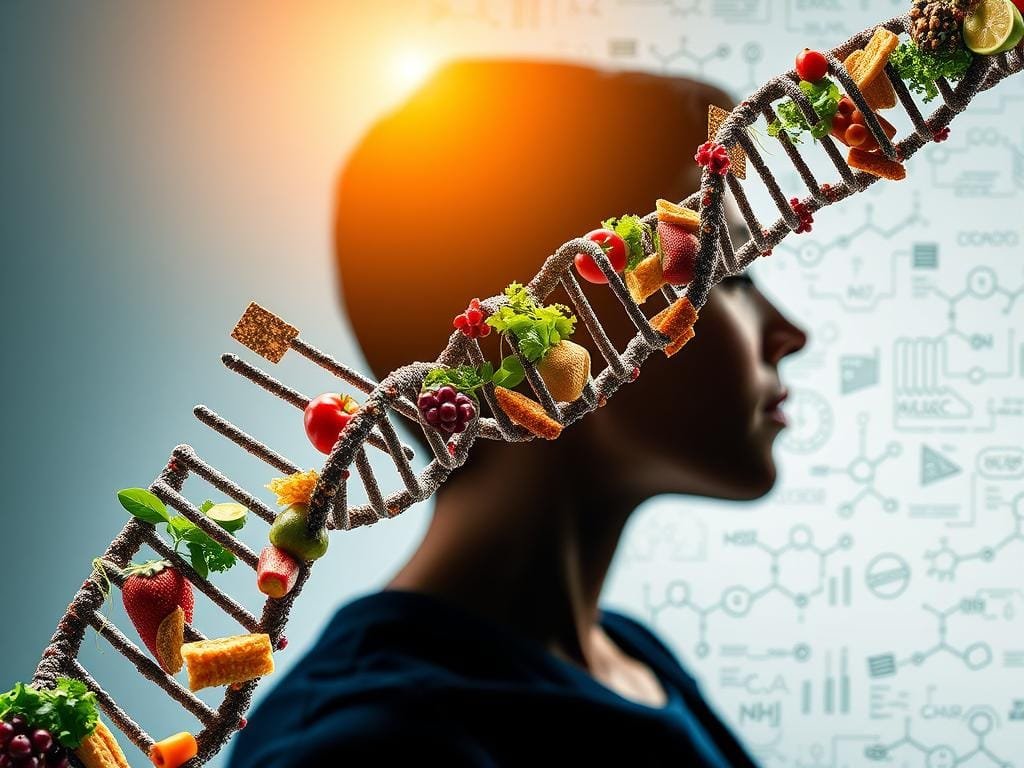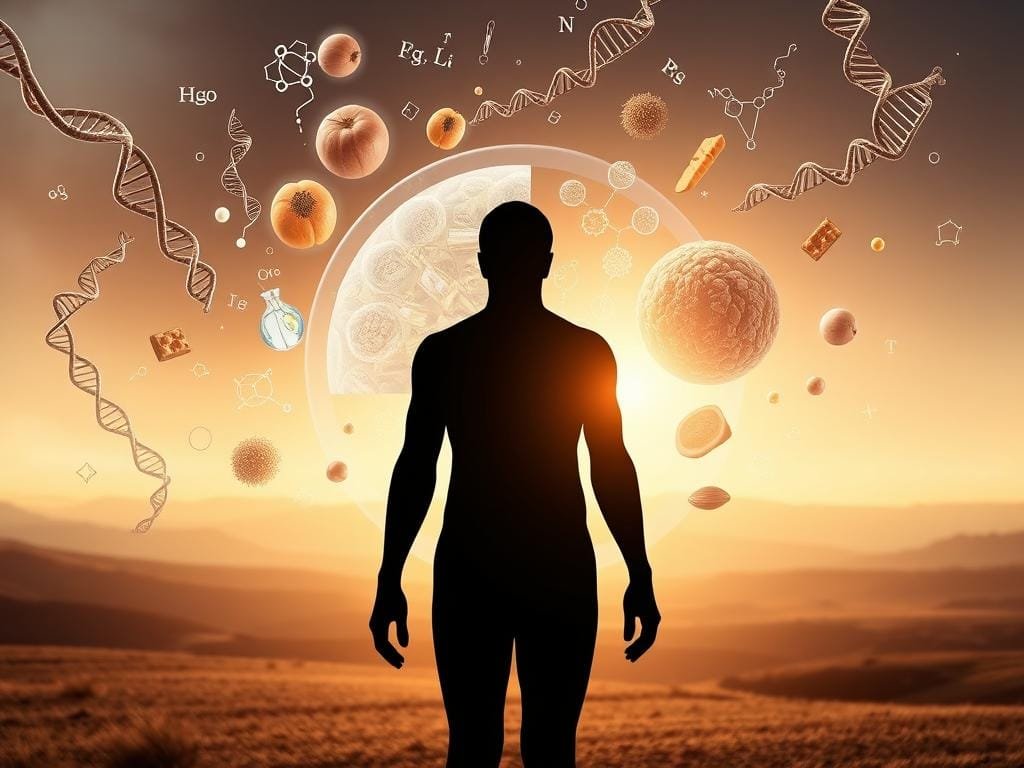Did you know that about 1% of a person’s genome is different from the standard? This difference can greatly affect what you need to eat. Personalized nutrition changes how we think about diet and health. It makes recommendations based on your unique genetic makeup.
This method can help improve your health and manage long-term diseases better. By knowing how your genes affect your diet, you can make better food choices.
Genetic differences can change how your body uses certain nutrients. For example, some genes affect how you process folate. Other genes can change what you need to eat.
To learn more about how genes affect what you need to eat, check out this research here. It’s also important to know your calorie and nutrient needs at different times in your life. You can find more about that here.
Table of Contents
Key Takeaways
- Personalized nutrition tailors dietary recommendations to your genetic profile.
- Genetic variations can significantly impact your nutritional needs and health outcomes.
- Understanding your genetic makeup can help you make informed dietary choices.
- Certain genetic variants can affect how your body metabolizes nutrients like folate and choline.
- Personalized nutrition has the ability to manage chronic diseases more effectively.
Understanding the Basics of Nutrition
Nutrition is key to your daily life, affecting your health deeply. It’s how your body uses food to live, grow, and work right.
What is Nutrition?
Nutrition is about getting the nutrients your body needs. These nutrients help your body grow, stay healthy, and fix itself. Eating a balanced diet gives your body what it needs to work well.
“The food you eat can either be the safest and most powerful form of medicine or the slowest form of poison.”
Key Nutrients and Their Roles
Your body needs several key nutrients to function. These include:
- Carbohydrates: Give your body energy.
- Proteins: Help build and fix tissues.
- Fats: Important for brain work and vitamin absorption.
- Vitamins and Minerals: Key for immune and nerve functions.
| Nutrient | Role in the Body | Food Sources |
|---|---|---|
| Carbohydrates | Provide energy | Bread, pasta, fruits |
| Proteins | Build and repair tissues | Meat, eggs, dairy products |
| Fats | Support brain function and vitamin absorption | Nuts, oils, fatty fish |
Why Personalized Nutrition Matters
Personalized nutrition is vital because everyone’s nutritional needs are different. Your genes, lifestyle, and health status play a role. Eating a balanced diet that fits your needs can boost your health and prevent diseases.
Knowing your nutritional needs and making smart choices can help you stay healthy. It’s about being aware of what you eat and making sure you get the right nutrients for your well-being.
The Connection Between Genetics and Diet
Genetics can greatly affect how your body reacts to different foods and nutrients. This connection is key to creating a diet that fits your genetic makeup. It helps ensure you get the nutrients you need.
Your genes play a big role in how you process nutrients and your risk for diet-related health issues. For example, some genes affect how your body uses folate, a vital nutrient. The MTHFR gene is one such gene, important for folate metabolism.
How Your Genes Influence Nutritional Needs
Genetics can change your nutritional needs by altering how your body uses nutrients. Some genetic changes can make it hard for your body to use certain vitamins and minerals. This means you might need to adjust your diet.
- Genetic variations can affect nutrient metabolism, such as folate and vitamin B12.
- Some genes influence your body’s ability to absorb nutrients from food.
- Genetic predispositions can make you more susceptible to certain nutritional deficiencies.
Knowing how genetics affect your nutrition can help you and your dietitian create a diet plan that’s just right for you.

The Role of Epigenetics in Nutrition
Epigenetics is the study of how environment affects gene expression. It’s very important in nutrition. Your diet can change epigenetic markers, which can impact your health and even the health of your children.
Studies show that diet can lead to epigenetic changes. These changes can affect your risk for diseases and overall health. For example, eating foods rich in nutrients can help keep genes healthy. But, a diet lacking in important nutrients can cause harm.
“The emerging field of nutritional epigenomics is revealing how diet can influence gene expression and, consequentially, our health.”
By understanding the link between genetics, epigenetics, and diet, you can make better choices about what you eat. This could lead to better health for you.
Identifying Your Unique Nutritional Needs
Personalized nutrition begins with knowing what your body needs. Your nutritional needs depend on your body type, metabolism, and health. It’s key to get these right for a good diet.

Assessing Your Body Type
Your body type is important for your diet. There are three main types: ectomorph, mesomorph, and endomorph. Knowing your type helps you choose the right foods. For example, an ectomorph might need more protein for muscle, while an endomorph should eat fewer calories to stay slim.
Understanding Your Metabolism
Metabolism also shapes your nutritional needs. How fast your body burns calories affects nutrient use. If you burn calories quickly, you might need to eat more often. But if you burn them slowly, you might need to eat less to avoid gaining weight.
The Importance of Blood Testing
Blood tests are great for spotting nutrient gaps. They show what vitamins and nutrients you’re missing. For instance, a test might show you’re low on vitamin D or iron. This lets you change your diet or add supplements. Regular tests help keep your nutrition plan on track.
By looking at your body type, metabolism, and blood tests, you can really understand your nutritional needs. This way, you can make a diet that’s just right for you, helping you stay healthy and feel great.
Tailoring Your Diet to Your Genetic Makeup
Customizing your diet based on your genes is a smart way to get the most from Nutrition. Knowing your genetic traits helps you choose the right foods for your body. This way, you meet your unique nutritional needs.
DNA Testing for Nutrition Insights
DNA tests can show how your body handles different nutrients. This info helps you adjust your diet to fit your genetic makeup. For example, tests can show if you can digest lactose or if you’re sensitive to gluten.

Food Sensitivities and Allergies
It’s important to know which foods might cause problems for you. Common culprits include gluten, dairy, and soy. Avoiding these can help reduce inflammation and boost your health. Genetic tests can spot these sensitivities, guiding your food choices.
Customizing Macronutrient Ratios
Adjusting the balance of carbs, fats, and proteins based on your genes can also be beneficial. Some genes affect how you process these nutrients. By tweaking your ratios, you can enhance your energy, manage weight, and improve health.
To tailor your diet right, talk to a healthcare expert or a registered dietitian. They can help you understand your genetic data and craft a diet plan that’s just for you.
The Role of Gut Health in Personalized Nutrition
Your gut health is key to your overall well-being. It’s important for personalized nutrition. The gut microbiome, with trillions of microorganisms, affects digestion and immune response. A balanced gut microbiome helps you get the most from your food.
Gut Microbiome and Its Impact
The gut microbiome is a complex system that affects nutrient processing. An imbalance can cause digestive problems and inflammation. It’s linked to obesity and diabetes, showing its role in metabolic health.
For more on how diet affects health, check out this resource on natural supplements.

Foods That Support Gut Health
Eating foods high in fiber, like fruits and vegetables, helps your gut. Fermented foods, such as yogurt, also support gut health. A balanced diet with these foods keeps your gut microbiome in check.
- Fruits and vegetables high in fiber
- Whole grains like oats and barley
- Fermented foods such as yogurt and sauerkraut
- Legumes, including beans and lentils
Probiotics vs. Prebiotics
Knowing the difference between probiotics and prebiotics is important for gut health. Probiotics are live bacteria and yeasts that are good for your gut. They can be found in fermented foods or supplements. Prebiotics are non-digestible fibers that feed probiotics, helping them grow in your gut.
By choosing the right foods and understanding gut health, you can improve your healthy eating. This leads to a balanced diet that meets your unique needs.
Navigating Food Labels and Ingredients
Understanding food labels is key for personalized nutrition. With so many products out there, it can be hard to know what’s in your food. But, by learning to read labels well, you can choose better for your diet.
Understanding Nutritional Information
The nutritional information panel on food labels is very helpful. It shows the amounts of nutrients like fats, carbs, proteins, and vitamins. To use this info well, look at:
- Serving size and servings per container
- Total fat, including saturated and trans fats
- Cholesterol and sodium content
- Total carbohydrates, including dietary fiber and sugars
- Protein content
Ingredients to Avoid
Some ingredients can harm your health if you eat too much of them. Watch out for:
- Artificial preservatives and additives
- High-fructose corn syrup and other added sugars
- Partially hydrogenated oils (trans fats)
- Excessive sodium
Reducing these can help you eat healthier and meet your dietary needs.
Choosing Whole Foods
Choosing whole foods over processed ones is a big step towards better nutrition. Foods like fruits, veggies, whole grains, lean proteins, and healthy fats are full of nutrients. They don’t have the additives found in processed foods. To eat more whole foods:
- Plan meals around seasonal produce
- Shop the grocery store’s perimeter for fresh foods
- Cook at home with simple recipes
These changes can greatly improve your nutrition and health.
Meal Planning for Optimal Nutrition
Starting with meal planning is key to better nutrition. A balanced meal plan meets your dietary needs. This supports your health and well-being.
Creating a Balanced Meal Plan
A balanced meal plan includes foods from all groups. This means whole grains, lean proteins, and colorful vegetables. These foods give you vitamins and minerals.
First, figure out your daily nutritional needs. Consider your age, gender, and how active you are. Then, plan your meals to meet these needs. This ensures you get the right nutrients.
For example, oatmeal with fruits and nuts is a great breakfast. It has complex carbs, fiber, and healthy fats. Knowing nutrition facts helps you make better choices.
Incorporating Diversity in Your Diet
Diversity in your diet is essential. It means eating different colored vegetables, various proteins, and whole grains. Rotating your food choices prevents nutrient deficiencies and keeps your diet interesting.
For instance, mix leafy greens like spinach and kale with other veggies like bell peppers and carrots. This variety supports gut health and boosts vitamin intake.
Snacks That Boost Energy
Snacking is vital for energy all day. Choose snacks rich in nutrients like fruits, nuts, and wholesome energy bars. Avoid sugary snacks that cause energy drops.
Healthy snack options include apple slices with almond butter, Greek yogurt with berries, or trail mix with nuts and dried fruits. These snacks give quick energy and add to your nutritional intake.
The Role of Supplements in Personalized Nutrition
Supplements are key in personalized nutrition, filling gaps when food alone isn’t enough. They help you reach your health goals. Knowing how they support your nutrition is vital.
When to Consider Supplements
You might need supplements if your diet is limited, you have health issues, or need more nutrients. For example, learning about essential nutrients can show diet gaps that supplements can cover.
Always talk to a healthcare expert before starting supplements. They can guide you on what’s best for your health.
Types of Supplements and Their Benefits
There are many types of supplements, each with its own benefits. Here are a few:
| Type of Supplement | Benefits |
|---|---|
| Multivitamins | Ensure you get all essential vitamins and minerals, filling diet gaps. |
| Omega-3 Fatty Acids | Good for heart health and may lower inflammation. |
| Probiotics | Boost gut health, improving digestion and immune function. |
Knowing about different supplements and their benefits helps you choose wisely. Always pick high-quality ones from trusted sources.
By adding supplements to your nutrition plan, you can meet your nutrient needs. This supports your overall health and well-being.
Staying Consistent with Your Nutrition Plan
Keeping up with a nutrition plan is key for good health. Start by setting goals that fit your needs and genes.
Realistic Milestones
Setting goals you can reach keeps you on track. Break big goals into smaller steps to keep moving forward.
Monitoring Progress
Tracking your progress helps you tweak your plan. Watch your food, how your body reacts, and how you feel overall.
Expert Guidance
Getting help from a healthcare pro is a big plus. For tips on starting a healthy diet, check out Boost Healthy Life. They offer advice on making smart food choices.
